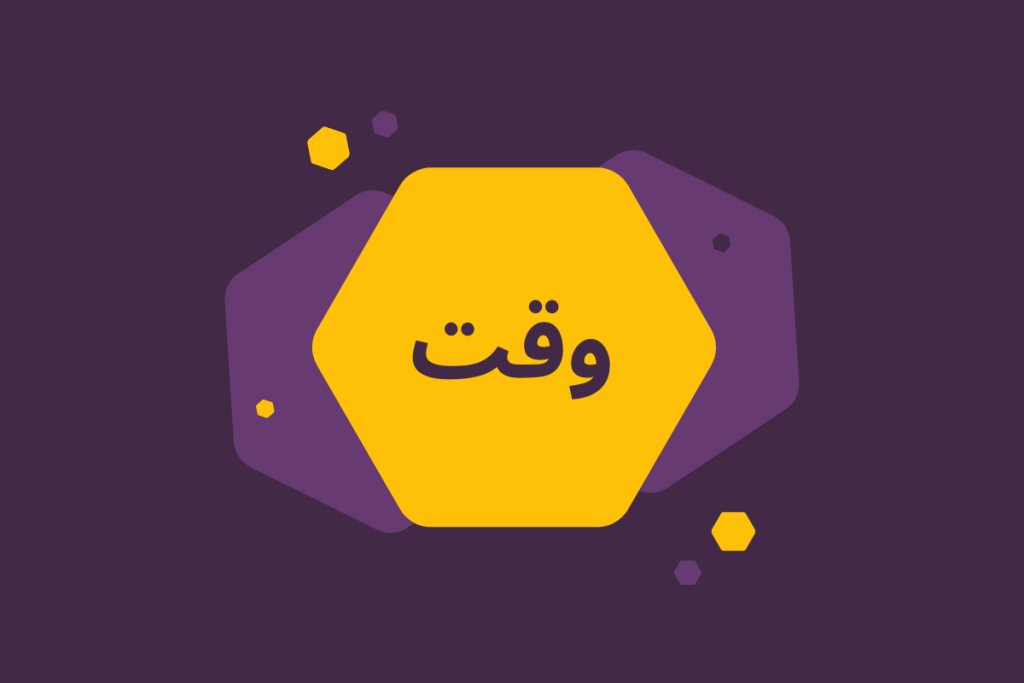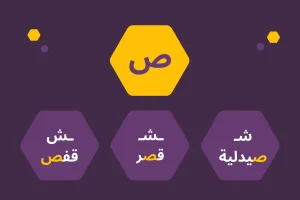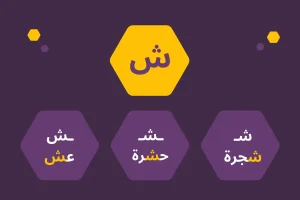
Word of the Day
Waqt
وقت
Welcome back to our Arabic Word of the Day series!
Today, we’re studying the word وقت /waqt/, which means “time.” We will examine its main meaning, common expressions used with the word وقت, collocations, derivations, and synonyms.
Are you ready?
Main Meaning
In Arabic, the word وقت /waqt/ is a noun that refers to a span of time, such as an hour or a few minutes. It is used when you want to talk about a specific moment or duration. For example:
It’s time for prayer.
Ḥāna waqtu alṣṣalāti
حان وَقتُ الصّلاةِ
Here, وقت refers to the particular time set aside for prayer.
Another example:
The program lasts a full hour.
Waqtu albarnāmji sā‘atun kāmilatun
وَقتُ البَرنامجِ ساعةٌ كامِلةٌ
Common Proverbs and Expressions
Now let’s look at some common Arabic proverbs and expressions that use the word وقت:
Time is like a sword; if you don’t cut it, it will cut you.
Alwaqtu kālssayf in lam taqṭaʻhu qaṭaʻak
الوَقتُ كالسَّيف إن لم تَقطَعهُ قَطَعَك
This famous Arabic proverb emphasizes the importance of managing time wisely.
How short the time was between them, as if it were the time between the blossoming of a flower and its fading away.
Mā kāna aqṣr waqtan kāna baynahumā kʼannahu alwaqtu bayna alwardi wālqurbi
ما كان أقصر وقتا كان بينهما كأنَّهُ الوقتُ بين الوردِ والقُربِ.
This is a verse from a poem where the poet expresses how brief the time felt between the losses of two loved ones. He compares it to the fleeting moment between the moment a flower blooms and the moment it fades away.
Collocations
The term وقت can be combined with other words to convey more precise meanings. Let’s look at three common collocations with the word وقت:
Free time
Waqtu alfarāghi
وَقْتُ الفَرَاغِ
I feel bored during my free time.
Ash‘uru bilmalali waqt alfarāghi
أَشعُرُ بِالمَلَلِ وَقتَ الفَراغِ
The present time
Alwaqtu alrāhin
الوقتُ الراهنِ
I am studying Arabic at the present time.
Anā adrusu allughata al‘arabiyyata fī alwaqti alrāhini
أنا أدرسُ الُّلغةَ العَرَبيّةَ في الوَقتِ الرّاهِنِ
The Day of the time well-known
Yawmu alwaqti alma‘lūmi
يومُ الوقتِ المعلومِ
This phrase is used in the Quran in Surat Al-Hijr (38) to refer to the Day of Resurrection (The Day of the time well-known).
Here are other collocations (verbs and adjectives) that are combined with the word وقت:
Word + Verb
organize time
yunaẓẓimu alwaqt
يُنَظِّمُ الوَقت
invest time
yastathmiru alwaqt
يَستَثمِرُ الوَقت
waste time
yuḍyʻu alwaqt
يُضيعُ الوَقت
manage time
yudyru alwaqt
يُديرُ الوَقت
pass time
yumḍy alwaqt
يُمضي الوَقت
Word + Adjective
short time
waqtun qaṣyr
وَقتٌ قَصير
valuable time
waqtun thamyn
وَقتٌ ثَمين
suitable time
waqtun munāsib
وَقتٌ مُناسِب
late time
waqtun mutaʼkhkhir
وَقتٌ مُتَأخِّر
Enough time
waqtun kāfin
وَقتٌ كافٍ
Derivations
Several words in Arabic are derived from the same root وقت:
Appointment
Mīqāt
مِيقات (Noun)
Say, [O Muhammad], "Indeed, the former and the later peoples are to be gathered together for the appointment of a known Day." - Surat Al-waqi’a
Qul inna alʼawwalīna wālʼkhirīna lamajmūʻūna ilá mīqati yawmin mmaʻlūmin
قُلۡ إِنَّ ٱلۡأَوَّلِينَ وَٱلۡأٓخِرِينَ لَمَجۡمُوعُونَ إِلَىٰ مِيقَٰتِ يَوۡمٍ مَّعۡلُومٍ - الواقعة 50:49
Timed
Mawqūt
مَوقوت (Adjective)
Add a timed fade to the beginning of your video to enhance its effect.
Aḍif talāshin mawqwt ilá bidāyati al-fīdyū litaʻzyzi atharh.
أَضِف تَلاشٍ مَوقوت إِلى بِدايَةِ الفيديو لِتَعزيزِ أَثَره.
Temporary
Mu’aqqat
مُؤَقَّت (Adjective)
This position is temporary and will last for six months.
Hādhihi alwaẓīfa mu’aqqat wa satastamir limuddat sittat ashhur
هذه الوظيفة مُؤَقَّتة وستستمر لمدة ستة أشهر.
Synonyms
The word وقت is often interchangeable with words like زَمَن /Zaman/ and مُدّة /Muddah/, which also mean “time” or “duration.” Here’s how you can use them in context:
The lesson time is forty minutes.
Waqtu alḥiṣṣati alddirāsiyyati arba‘ūna daqīqatan
وَقتُ الحِصّةِ الدِّراسيَّةِ أَربعونَ دَقيقة
The lesson duration is forty minutes.
Zamanu alḥiṣṣati alddirāsiyyati arba‘ūna daqīqatan
زَمَنُ الحِصّةِ الدِّراسيَّةِ أَربعونَ دَقيقة
The lesson duration is forty minutes.
Muddatu alḥiṣṣati alddirāsiyyati arba‘ūna daqīqatan
مدّةٌ الحِصّةِ الدِّراسيَّةِ أَربعونَ دَقيقة
Both وقت and زمن can be used interchangeably in these examples.
Reflect on the Past
Another common use of وقت is in expressions referring to past events:
In the past, I was a student in school.
Fī alwaqti al-māḍī kuntu ṭāliban fī al-madrasati
في الوَقتِ الماضي كُنُتُ طالِبًا في المَدرَسةِ
In the past, I was a student in school.
Fī alzzamani al-māḍī kuntu ṭāliban fī al-madrasati
في الزَّمَنِ الماضي كُنُتُ طالِبًا في المَدرَسةِ
Both sentences use وقت and زمن to describe past moments.
Conclusion
We hope today’s word وقت (waqt) has helped you understand its many uses in the Arabic language. Time is a concept that plays an important role in daily life, and knowing how to express it in various contexts allows you to connect more meaningfully with the language.
As always, practice makes perfect! Try using the word وقت in your conversations, and make sure to download our app to get loads of useful exercises that will take your fluency to another level.
Stay tuned for more words from the rich Arabic vocabulary!
You can also find other words to learn by visiting the Word of the Day page.




